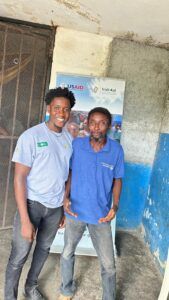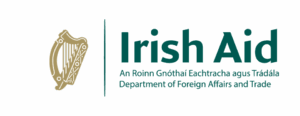 Stories
Stories
November 13, 2025 • 2 min read
In Port-au-Prince, Haiti, escalating armed group violence and widespread displacement have pushed thousands of families into a daily struggle for survival. According to the April 2025 IPC report, more than 5.7 million Haitians—half of the population analyzed—are facing Crisis (IPC Phase 3) or worse levels of food insecurity, including over 2.1 million in Emergency (Phase 4). In displacement camps around the capital, families survive on a single meal a day, with limited access to basic services and livelihoods.
Among those hardest hit are Azema, 50, and Thomas Marie, 49, both heads of households who were forced to flee their homes with their families after armed attacks.
“I used to live with my wife and two children. I had a job, and my wife ran a small business. But one-night, armed groups attacked us, burned our house, and we lost everything,” recalls Azema.
For Thomas Marie, life also changed overnight. “I lived in Sicot with my three children. I sold small goods to cover school fees and meals. After fleeing to the camp, some days we spent the whole day without eating.”
In the displacement site where both families now live, food insecurity remains severe. Rising prices, limited access to markets, and loss of income have left most residents without regular meals. Like 96% of displaced households in Port-au-Prince, both Azema and Thomas lost nearly all their sources of income.
Through the Acute Crisis Stream (ACS) program, funded by Irish Aid through Ireland’s Civil Society Partnership, GOAL provided emergency unconditional cash assistance to 600 internally displaced households—reaching approximately 3,000 people—at the Trentin IDP Site. The initiative, launched as a rapid response to the worsening food crisis, enabled families to meet their most urgent needs while restoring a sense of dignity and choice.
“When I received the cash assistance, I was able to pay off my debts and buy food for a few days,” says Azema. “I also used part of the money to buy water sachets to resell in the camp, so I could continue providing for my family.”
Thomas Marie used her grant to regain some economic independence. “I paid off debts and started selling akasan in the mornings. This allows me to feed my children every day.”
Beyond financial support, GOAL integrated awareness sessions on nutrition, hygiene, and cash management, empowering recipients to make informed and healthy choices.
“Thanks to the sessions, I now prioritize foods that strengthen our health, even with limited means,” says Azema.
“I’ve also learned to manage my small business better and plan our meals,” adds Thomas Marie.

The results speak for themselves. Post-distribution monitoring revealed that nearly 80% of supported households achieved acceptable food consumption scores, a significant improvement in such a constrained environment.
For both Azema and Thomas, the ACS program represents more than emergency relief—it is a bridge toward resilience amid persistent instability.
“I am grateful for GOAL’s help,” says Azema. “It gave us hope when we had nothing.”
Thomas Marie agrees: “We still face challenges, but with this support and the training, I can take care of my children again. I just hope GOAL continues to stand with us.”
Through targeted financial assistance and practical education, the Irish Aid-supported ACS program not only helped displaced families overcome acute food insecurity but also strengthened their capacity to adapt and rebuild their lives, one step at a time.

